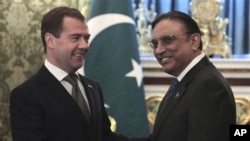With the death of Osama bin Laden, Russia is reaching out to Pakistan, Afghanistan and Central Asia in an effort to keep Islamic radicalism out of Russia’s southern flank.
Russia and Pakistan pledged Thursday to work together to fight terror as the Kremlin welcomed Pakistan’s president for his first major foreign visit after the killing of Osama bin Laden.
Pakistani President Asif Ali Zardari was quoted telling Russian President Dmitry Medvedev, "Our countries are very close neighbors, we are located in the same region, and although we do not share borders, our hearts beat in unison.”
The blossoming Russia-Pakistan relationship comes on the heels of reports that Russia is negotiating to place 3,000 Russian border troops on Tajikstan’s border with Afghanistan. At the same time, Russia has started upgrading ties with Afghanistan.
The moves indicate that Russia is scrambling to adjust to a post-Osama bin Laden world. For much of the last decade, Russian officials enjoyed the luxury of criticizing the NATO presence in Afghanistan.
“The Soviet experience in Afghanistan was a failure. It led to failure, and they were sure in Moscow that the same destiny is for Americans,” said Alexey Malashenko, Central Asia expert at Carnegie Moscow.
Now Russian officials worry they may soon get what they wished for. Public pressure is growing in the United States to speed up troop withdrawals from Afghanistan.
“For Russians, it is a real nightmare if Americans are leaving Afghanistan quickly,” said Andrei Kazantsev, a Central Asia security expert at the Moscow State Institute of International Relations.
In recent months, President Medvedev twice hosted Afghan President Hamid Karzai in Russia.
“There is an acute fear that Afghanistan will not be stable after the American and other forces leave. And that it will eventually collapse into some sort of near civil war. There is of course some fear of the Taliban returning to power. The Taliban do not see any difference between Russians and Americans. For them, they are all enemies,” said Konstanin Von Eggert, a Russian world affairs analyst, who tracks the Kremlin’s turnaround.
Russia’s new activity in the region is high profile.
With Pakistan, Russia is signing new trade and aid agreements, including a plan to modernize a Soviet era steel plant in Pakistan. As the American killing of Osama bin Laden strains relations with the United States, Pakistan’s president is offering Russia a special relationship, saying in one interview,“Tsarist Russia was dreaming about getting access to the southern seas.”
With Tajikstan, Russia wants to bolster its border with Afghanistan, adding to a Russian-commanded motorized rifle division already stationed there. Tim Epkenhans, a Central Asia expert, does not believe that Russia will take over border duties in Tajikstan. “Russians want to demonstrate who is the major power in the region,” he said
Russia’s fear is that an accelerated American withdrawal could bring the Taliban to the gates of Central Asia, an area that Russia wants to see free of Islamic radicalism. Von Eggert says that the 10 million Central Asians who work in Russia could serve as a pipeline for extremist views to Russia’s Muslim minority. “The success of the Taliban will have a direct impact on Tajikistan, Uzbekistan and, possibly, Kyrgyzia,” he said.
Tajikstan and Uzbekistan are former Soviet republics that border Afghanistan. There are large ethnic Uzbek and Tajik populations in northern Afghanistan. During the 1990s, when the Taliban ruled Kabul, Russia armed Uzbek and Tajik warlords as a way to keep Islamic radicalism away from Russia’s historic sphere of influence.
If the central government in Kabul weakens again, Kazantsev says, Russia could revert to this "wall" strategy.“This situation of the late 90s, when Russia was left alone against the Taliban. This can be repeated. This is something like a nightmare for Russia,” he said.
Analysts here agree that Russia will avoid putting boots on the ground in Afghanistan. Memories are raw of the Soviet intervention in Afghanistan in the 1980s, an operation that left 15,000 Soviet soldiers dead and 50,000 wounded.
With Russia facing presidential and parliamentary elections over the next year, Kazantsev says chances are zero that Russia will offer to replace NATO troops in Afghanistan. “If Russia sends troops again into Afghanistan, it would be an electoral nightmare for Russian elite,” he said.
But Russian military training could resume. Hekmat Karzai, cousin of the Afghan president, talked to VOA in Moscow this week. “A lot of our military were trained by the Soviet Union. So that kind of training and that kind of capacity can be increased,” he said.
Karzai, who runs the Center for Conflict and Peace Studies, a think tank in Kabul, says relations between the presidents of Russia and Afghanistan are increasingly warm.
“There is a great relationship building between Afghanistan and Russia,” he said.
So, after 10 years of American-sponsored stability in Afghanistan, Russia may be joining a new great game for influence in this historic crossroads of Central Asia.
Russia Courts Pakistan, Afghanistan and Central Asia
- By James Brooke




